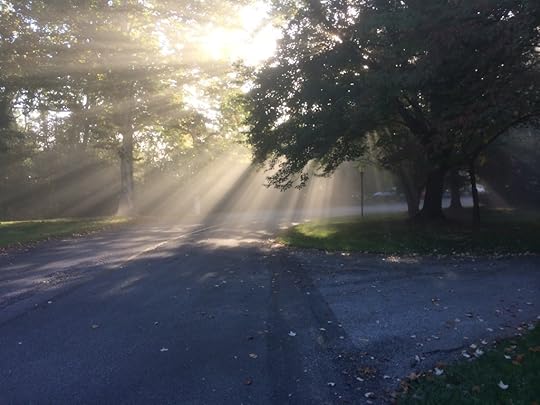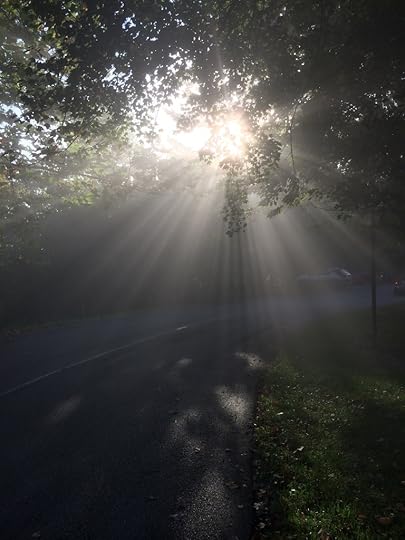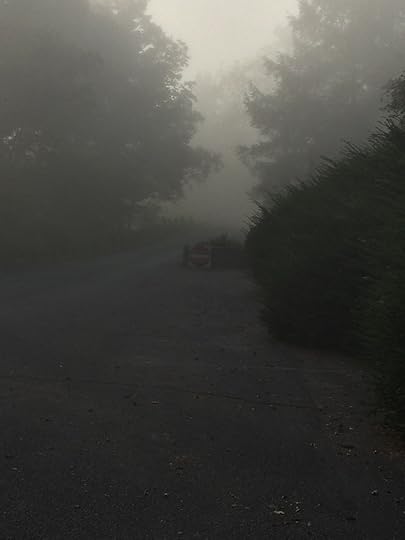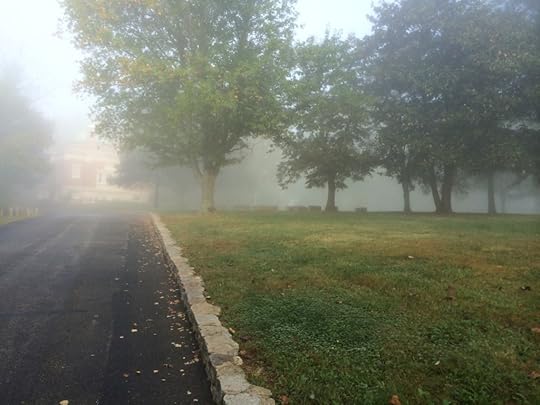Robyn Ryle's Blog, page 12
January 5, 2015
Madison Monday: It’s cold out there
It’s cold out there this Monday. A balmy 14 degrees as I write. It’s the kind of cold that makes your teeth and your face hurt, though that may also be because just the day before, it wasn’t that cold at all. Sometimes in Indiana I think I can feel the next weather front coming though inside my sinus cavities.
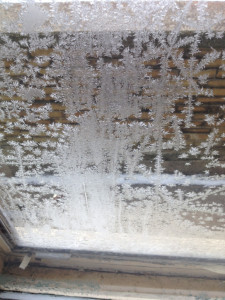
A picture from last year’s winter, just in case you need reminding
It’s cold, but I’m reminding myself that last winter this time was also the first day of the winter semester at the college. At least it was supposed to be, but yet another winter storm blew through (at that point last winter, I had already stopped counting which winter storm it was) and so classes were cancelled. This time last year, I was looking out the window and staring straight into the face of the polar vortex and it was ugly. Last winter was malicious. Hateful. I spent most of the spring and summer recovering from the trauma of last winter.
I don’t want to jinx us, but this winter is already better than last year. It’s going to have to work pretty hard to be worse (sincerely hoping Mother Nature doesn’t take that as a challenge). Whenever anyone complains about the cold this year, I laugh and think to myself, “It’s not as bad as last winter.” Maybe that’s the point.
Maybe the whole point of last winter was to make every winter after it seem like a breeze. Maybe it was a lesson in what winter could be, and if so, consider my lesson learned. I’ll take two weeks worth of days without sunshine. I’ll take snow before Thanksgiving. I’ll take this short plunge into frigid temperatures. I’ll take being able to walk outside, even if it’s cold, because the sidewalks aren’t covered with snow and frozen ice that lasts into March. I’m hoping that there is no winter worse than the one last year, and I hope I never have to find out any different.
January 3, 2015
Some of my favorite stories of 2014
One of my New Year’s resolutions for 2015 is to keep better track of the stories and essays I read online and love. That’s a warning that I didn’t do a particularly good job in 2014. Part of the problem is that there’s so much good writing! Seriously, if you’ve never checked out some of these online (and print) magazines, you should.
Here are just a few stories that really stuck out for me, keeping in mind that there are a whole lot of others I”m forgetting:
– Crepuscular by Leesa Cross-Smith at Wyvern Lit – It’s no secret that I love Leesa’s writing, and Leesa, too. And I love Wyvern Lit, a new litmag edited by the adorable Brent Rydin. I had the great privilege to hear Leesa read “Crepuscular” at our local bookstore, Village Lights. Leesa went to one of those performing arts high schools and it shows when she reads. Let me just say that she knows how to do it right, how to tell a story. How to entertain. This is how all of us should read.
This is how all of us should write–fearlessly. There’s nothing that’s off limits. For a long time, I think I internalized the idea that “serious” writers, or literary writers, or something like that, don’t write about sex. It’s off limits. Reading Leesa’s work made me think about how stupid that is. Why not write about sex? About desire? Why not write about a woman who gets a crush on the host of a nature show and then meets him and seduces him?
– Notes for a Story by Travis Hessman at PANK – I tend to like stories with a little edge of humor. There’s no reason to be so serious all the time. I find this story hilarious, but it may be a writer thing. “[The first line] should provide in the reader an impulse to defend the nature and structure of the empirical universe, an impulse only satisfied through further ravenous reading.” Of course it should, but it’s so much easier to describe what the first line should do then it is to write it. In fact, it’s so much easier to describe what you want the story to do than it is to write the story. That’s the joke.
I don’t know exactly how to describe the writing in PANK. I guess, experimental? I just know that when I read stories there, they make me think about new possibilities for words, and that’s a good thing.
– Concretia Dementia by Cathy Adams at A River & Sound Review – This story is how I discovered A River and Sound Review, and I’m glad I did. I like how they describe themselves–“serious literature with an unpretentious soul.” I could imagine my mom liking this story, and I think that’s a good thing. I like stories about old people. I love strong, first-person narrators. I love the simple sweetness paired with the quirky. It is just a lovely, lovely story.
– Fragmented Instructions for Half-Formed Girls by Claire Lombardo at LunaLuna Magazine – With Amanda Miska as fiction editor, the stories at LunaLuna magazine this year were pretty great. This one might have been the best. I love the way this story is both internal and external. Very much about the main character, but it also fleshes out a world at the edges. A community of people looking in and observing. That’s a difficult balance to find and Lombardo does it with grace.
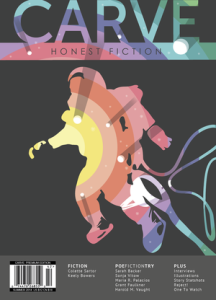 - Three 100-Word Stories by Grant Faulkner at Carve Magazine – I love Carve Magazine. I love 100-word stories. I love Grant Faulkner, who gave us all National Novel Writing Month. I love the fact that the person who invented NaNoWriMo–a contest all about writing 50,000 words–writes some kick-ass, very, very short stories. Just listen to this first line–“Frank hadn’t bought a pair of pajamas in 23 years.” It only gets better from there. Little novels in 100 words. Perfect.
- Three 100-Word Stories by Grant Faulkner at Carve Magazine – I love Carve Magazine. I love 100-word stories. I love Grant Faulkner, who gave us all National Novel Writing Month. I love the fact that the person who invented NaNoWriMo–a contest all about writing 50,000 words–writes some kick-ass, very, very short stories. Just listen to this first line–“Frank hadn’t bought a pair of pajamas in 23 years.” It only gets better from there. Little novels in 100 words. Perfect.
December 30, 2014
Parker house pretzel rolls and a train of thought
Today I made these Parker house pretzel rolls. They didn’t turn out as pretzel-y as the picture. And they might not have been as done as they could have been. Neither of these things kept me from eating three rolls, straight out of the pan, right out of the oven, and burning my mouth in the process. I didn’t make them to “go” with anything. I just made them to see if I could and that’s pretty much what I accomplished today.

These rolls! (from Smitten Kitchen)
Yesterday I bought a car, which is one of THE WORSE THINGS EVER, so all I can say is that it’s done. And I have a new car. A cross-over instead of my old station wagon, which is kind of funny, if you think about it (and I do). I bought my station wagon when I was single and childless. A friend once explained that I bought the car for the life I wanted. Now I’m married with a thirteen-year-old and I bought a smaller car. Nothing we do as humans makes much sense and this is what makes life so interesting.
But none of that is the particular train of thought I sat down to share, which has to do with writing.
Yesterday (or maybe the day before–it’s break, and the days melt into each other a bit, gooey and sticky-like),–I got a rejection. It wasn’t a bad rejection. It wasn’t the worst rejection.* It was a vaguely personal rejection. It contained that lovely phrase, “Please send us more of your work.” So, you know, it was another day in the life of a writer.
Then I saw a writing friend on Twitter tweet about an acceptance from the same journal I’d just been rejected from.** And you can imagine how that felt. Less good than eating a hot Parker house pretzel roll straight out of the oven. Not as bad as having to go buy a car.
Not long before that someone on Twitter talked about being rejected for solicited pieces and that seemed to be a thing that would suck. A new thing on the list of things that would suck as a writer–one that’s still out there, looming in my future. To be solicited and then have someone tell you, never mind. Would that be better or worse than being rejected straight from the slush pile?
I thought, as I do many times, about what the point of it all is. What am I doing here, anyway? Trying to get published. Taking tiny little baby steps forward. Big mother-may-I type steps backwards sometimes. Spending a lot of time with words. Just me and words.
A lot of times, I move through the world imagining there’s a finish line out there as a writer. There’s a place I’ll reach like a mountaintop, and I’ll take a deep breath. Look around. “I’ve made it,” I’ll say. Only, of course, there isn’t. There really isn’t.
And so here’s where the train of thought led me in the end–I’m never going to reach that mountaintop. Writing’s never going to make me happy. This isn’t the first time a train of thought has led me to this place. And it’s not only writing. Here’s a short list of things I’ve realized are never going to make me happy: losing weight, buying a car, going on vacation, getting a raise, finding the love of my life, my cat, eating four Parker house pretzel rolls straight out of the oven, being liked, being a parent, winning an award, making a lot of money and getting a story published. Yeah, that’s the short list.
Don’t get me wrong. Most of these things are pretty good. A lot of them have made me happier than I was before. More content. Fuller and deeper as a person. None of them can make me happy, though. Only I can do that, and even so, not all of the time.
Don’t get me wrong. I like writing. I read a couple of quotes from Susan Sontag recently that sum up a small part of what I like about it. “What draws me very much to writing is it’s a way of paying attention to the world.” Also, “My idea of a writer: someone interested in everything.” I like the way writing gives me a reason to be interested in everything. That’s one thing on a long list of things I like about writing.
But every now and then I have to remind myself, there’s no moment when it will all click together and I will be happy because that’s just not what’s writing for.
* The worse rejection I ever got was an e-mail from Submittable, and all it said was, “The status of your submission has changed.” And when I went to Submittable, my story had moved from “In Process” to “Declined.” Just like that. I’m still mad about it. It happened twice and I’ll never submit to those journals again. Sometimes, I tell myself they did that by mistake. It was an accident, right? Because even Tin House has the decency to write a form letter. Why wouldn’t you write a form letter? Write a gooddam form letter, people! Enough about that.
** Of course, I am not a complete jerk, so I was also happy for this person on Twitter who got an acceptance from this journal. I’m really always happy when someone I know gets an acceptance, even if it was like twenty years ago. We should celebrate acceptances for at least twenty years. Seriously.
December 7, 2014
About: How to Identify Birds in the Wild
A little bit about my story, “How to Identify Birds in the Wild,” at LunaLuna Magazine.
Fast Facts:
First draft written: August 2013
Number of drafts written: 7-9
Number of rejections: 1
From submission to publication: 3 months
The idea
Big Oaks National Wildlife Refuge is a “Globally Important Bird Area” partly because of its population of Henslow’s sparrows, a species of concern in the state. So every summer a group of graduate students come to do a bird count in the park, which is just up the road from Madison. They all stay in our neighbor’s house across the street.

A Henslow’s sparrow
All summer long, we hear the sound of them leaving early in the morning and from my writing desk upstairs, I see them coming home early in the afternoon. They are sweaty or wet or dirty and they’ve spent all day out looking for birds.
We see them sometimes heading in a group to one of the local festivals. We introduce ourselves sometimes. They are like migratory birds themselves, settling in town for the summer. Exotic and foreign, right across the street. And, yes, I can see into their living room from my upstairs window when the shutters are open. I’m not sure if they can see into ours.
Writers and their characters
Before I started writing, I sometimes assumed writers were their characters. This was especially true when the writer’s biography was similar to the substance of their story. And of course, when they themselves described their work as autobiographical.
Here’s what I think personally about the relationship between writers and their characters–I both am all my characters and I am not. I can’t make characters come to life unless there’s something in them that I can understand, so I have something in common with all of them. But none of them are me.
I am not Rose. And not Manuel. And not the woman with the vintage t-shirt and the flabby arms, though we do have a red couch in our living room.
Segmentation and fragmentation
This story was originally called “Bird People.” And then “People of the Bird.” In neither incarnation was it a particularly good story. I didn’t like this story. When I originally sat down to write it, I imagined there would be someone scary, following her in the woods. But that’s not where the story went.
Then over the summer, I read a blog post by Kathy Fish about segmented structure in flash fiction. “I’ll give that a try,” I thought. I really liked the way Leesa Cross-Smith used segmentation in her story, “What the Fireworks Are For.”
There’s something very liberating about segmenting a story. Cutting it up into bits. There’s a kind of freedom there. The words need to say more and less. When I segmented this story, the images sharpened. The pieces of the narrative were already there. The scenes were laid out. Segmenting somehow allowed me to both fill them in and empty them out. It became a very different story.
I feel like I should say here, I don’t have an MFA. I took two creative writing classes in college, both of them from really good teachers, but that’s pretty much it. I go to conferences and workshops when I can, but if segmentation is the kind of thing you learn to do in a creative writing program, I didn’t learn it there. I’m really grateful for being able to cultivate an online writing community–to be able to learn from other writers there. I’m grateful to the folks who talk about their writing, who help carve out a little virtual space for those of us who might not have that.
The master naturalist class
I have often thought to myself, “I wish I could be a naturalist.” And then I said it out loud to a friend who answered, “You can.” For the amazing price of $35, you can sign up for a master naturalist class taught at Muscatatuck National Wildlife Refuge. It runs for 8 weeks with three hour classes once a week. Just the class on crawfish is well worth every penny, because let me tell you, crawfish are fascinating. I am not joking, but that’s a whole other story.
The master naturalist class gave me the idea to segment the stories around bird identification. The classes gave me the language of bird watchers–eye ring, wing spots, tail tips. It gave me the line, “Birds are always smaller than you think.” The class lent the story a whole other level that was just hovering at the edges before.
Afterwards
But even after I segmented it, I didn’t think this story was particularly good. Or maybe I just didn’t know the story very well. I segmented it. Sat on it for a few days. Re-read it. Edited it. Sent it out. And it was accepted, pretty quickly and with enthusiasm by the wonderful Amanda Miska.
Do we love our stories more the longer we spend with them? I sometimes feel this way about books. Long books–books that take weeks and months to read–become so intimate. There are stories I’ve worked on for so long, I feel like I could tell you every line. But I’ve had to re-read this story since it was published several times in order to remember what I wrote.
People seem to like this story, and that’s always good. But here’s something scary I’ve been thinking about: the longer I write, the less in control I feel of what ends up on the page. Not every story may be salvageable, and I don’t think I can tell which ones are and which ones aren’t. As a writer friend and I were discussing, I’m not sure if you get better at this or not. I’m not sure whether if, in writing, we are always just stumbling around in the dark. Sometimes our hand lands on the light switch, but each time, we have no idea if we’ll be able to find it again or not.
November 16, 2014
Madison Monday: In Real Life
I am not a particularly social media-savvy person. The first time I saw “IRL” on Twitter, I had to Google it to find out what it meant. “In real life,” as in, “I don’t talk about my cats as much IRL.” Let us hope no one talks about their cats as much IRL as they do online.
I also had to have one of my friends explain what trolling is. Then I became sadly familiar with it at a remove, watching the incredibly ugly things people say to public figures like Roxane Gay, who takes a very brutal online beating every time she speaks up about something important.
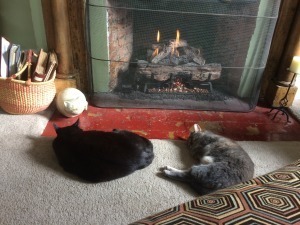
Cats, in real life
Even as I write this, I am probably being trolled online. I wrote an article for Gawker, which is a site that is kind of notorious for that. I swore to myself and my husband before the article went live that I wouldn’t look at the comments. So when the article went up, I read the first four comments and then I stopped. That was enough. (Mom, if you’re reading this, don’t read the comments. Take my word for it. Just don’t.)
In real life, I’m sitting on my couch in a house I love. I have a cup of tea and there are orange rolls coming out of the oven. In a minute, I’ll sit down and watch GameDay Morning on NFL Network, because that’s our Sunday morning ritual. A cat will probably show up and sit in my lap, because cats really are everywhere, even in real life.
Last night, we went to our favorite restaurant and sat at the bar. We caught up with friends, because we always run into people we know there. The night before, we had folks over for dinner. I spent all Friday afternoon making a chicken pot pie from scratch, which was quite a lot of work but well worth the effort. It was delicious.
That’s my weekend in real life, and I’m very lucky. There is certainly ugliness in the place I live. Madison has its own trolls, online and elsewhere. But I don’t have to have them over for chicken pot pie. They don’t sit at the bar with us, I guess because they are too busy trolling, which is sad for them. I can’t help but think that the people who troll must have a sad lack of beer and cats in their life. Or just not a lot of happiness in general.
I won’t sugar coat what it must feel like to have to endure online meanness and harassment day after day. I know what it felt like reading just those four comments, and only two of them were ugly. It felt like fear, in real life–my heart raced and my stomach churned. I hope for the sake of people who endure this daily that they develop a thick skin, because otherwise, it has to be taking a toll–a real, physical one on their bodies. I can’t imagine what that’s like and no one should have to endure it.
But in real life, it’s supposed to snow later tonight, and it occurred to me when I walked across our new bridge that it would be a beautiful place to watch snowflakes drift down onto town. So I think that’s what I’ll do.
November 10, 2014
Random Thoughts
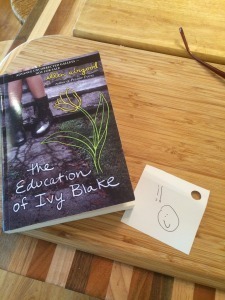 - I walked to Kentucky last week, my first time on the new pedestrian path. I’m working on a story where someone has to cross the bridge and it was interesting to contrast what I imagined it would be like up there as opposed to what it was really like. Less windy than I thought. Not as cold. The dots on the surface of the water way below were leaves. I’m not exaggerating when I say it felt kind of revolutionary, to be able to walk from one state to another.
- I walked to Kentucky last week, my first time on the new pedestrian path. I’m working on a story where someone has to cross the bridge and it was interesting to contrast what I imagined it would be like up there as opposed to what it was really like. Less windy than I thought. Not as cold. The dots on the surface of the water way below were leaves. I’m not exaggerating when I say it felt kind of revolutionary, to be able to walk from one state to another.
– I got an advanced review copy of my friend Ellen Airgood’s new middle grade novel, The Education of Ivy Blake. If you read Prairie Evers (and if you haven’t, you should go do so now), you’ll remember Ivy. This is her story. Not a sequel, but a companion book. I read a couple drafts of this book before it became a book and so got to watch it grow up something that seemed to happen so fast and so slow all at the same time. It’s a lovely book. No apocalypse or wizards. No ghosts or vampires. Just the real, complicated story of a girl trying to find her way in the face of being dealt a rough deck of cards. We need those kinds of stories, and this is a good one. You can pre-order it now at Village Lights.
– This adorable cat has decided to make writing nirvana her own. What this means is that as I sit in my chair trying to write, she walks back and forth across my lap. You might ask yourself, how many times can a cat walk back and forth across your lap before she’ll eventually stop? The answer is an infinite number of times. Forever. She can walk back and forth across my lap for forever. Or until I shove her off. Then she can come back and do it all again. This is not working out so well.
– I haven’t been writing a lot of blog posts because I’m teaching a new course this semester, and it’s a doozy. Sociological theory. I love theory. I’m not being sarcastic. I really do. I started a Tumblr all about theory if you’d like to check it out. This week we’re reading about Erving Goffman, who suggested that sociologists might be willing to trade “what we’ve so far produced for a few really good conceptual distinctions and a cold beer.” You have to love a man who has his priorities straight.
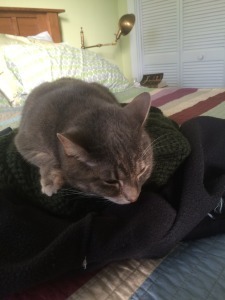 - I’m doing National Novel Writing Month again this year, and it’s going along. I have 16,529 words so far and I’m on pace to finish a little ahead of time. I’ve done more planning and pre-writing on this novel than ever before, but it’s still a chore, sitting down and writing at least 1,600 words every day. At the end what you have, of course, is not really a novel. You have a rough and often incoherent draft of a novel. And you have another long haul ahead of you to form it into something else. Something better.
- I’m doing National Novel Writing Month again this year, and it’s going along. I have 16,529 words so far and I’m on pace to finish a little ahead of time. I’ve done more planning and pre-writing on this novel than ever before, but it’s still a chore, sitting down and writing at least 1,600 words every day. At the end what you have, of course, is not really a novel. You have a rough and often incoherent draft of a novel. And you have another long haul ahead of you to form it into something else. Something better.
I’ve noticed a lot of NaNoWriMo scoffing out there in social media land. Some folks making fun of people participating and others espousing downright hostility. I guess I can understand that. Well, no, really I can’t. I believe that writing is generally a good thing for people to do. It can help you reflect on your life. See things from a different perspective. Make sense of the world. If one of the points of NaNoWriMo is to get more people writing, how can it be a bad thing? The writing may be bad, sure, but bad writing only really hurts you if you read it, and even then, only a little bit. Power writing a draft in a month is a way of writing that doesn’t work for some people, and that’s fine. No one said there was one way to do it. Maybe there’s something I’m missing. Some turf war between the “real writers” and the dilettantes, which, sure, is something you can become invested in. But, why?
– Speaking of which, I’ve been very aware of the meanness of the internet lately. Maybe just plain the meanness of the world. Maybe all the meditation I’ve been doing has finally edged me a little closer to enlightenment. But it’s ugly out there, and I don’t know what to do about that. It seems that there’s a real price to pay for trying to say something in the world, even if it’s something good. And that sucks. I don’t have any solutions or really any more than that to say about it. It’s just something I’ve been thinking about.
October 6, 2014
Madison Monday: Madison Coffee and Tea, Rebooted
It was touch and go the last few weeks of summer in Madison for me. Madison Coffee and Tea closed down for a re-model and a re-boot. As excited as I was about the changes, it wasn’t easy being deprived of my window work spot for weeks at a time.
 It’s hard for an established business to decide to give itself a makeover. First, there’s the investment it takes and the money lost while the place is closed down. Then there’s the risk of losing loyal customers; it’s hard to please everyone when you make a change. I applaud MC&T for being brave enough to take that plunge.
It’s hard for an established business to decide to give itself a makeover. First, there’s the investment it takes and the money lost while the place is closed down. Then there’s the risk of losing loyal customers; it’s hard to please everyone when you make a change. I applaud MC&T for being brave enough to take that plunge.
As you can see from the pictures, the interior looks amazing. I love the new wooden counters in the windows and the stools. Exposing the beams in the ceiling and painting everything white gives the space a nice open feel.
Then there’s the cappuccinos, produced by a new espresso machine imported all the way from Italy and as good as you’d get in any big city. Coming soon, they’ll add locally made bagels and sandwich items that insider information tells me will be delicious.
Even before the coffee shop closed for their renovations, I’d been going there a little less frequently than normal. It wasn’t about the coffee shop as much as the new writing space my husband helped me create in our house. Writing Nirvana, as he calls it, is a desk in our bedroom looking out the upstairs window. There’s a comfy chair in the corner and usually cats on the floor (when they’re not walking back and forth across my lap). It’s a good space for writing and as a consequence, I didn’t have as much need for the coffee shop.
 Here’s what I forgot over those months, though, hanging out in Writing Nirvana. It’s a quiet space. A good space for writing, but there’s something to be said for getting out of the house. There are distractions in the coffee shop, to be sure. Friends who wander in and out. Conversations to eavesdrop on. The sound of the espresso machine and the entertainment of the action on the street outside. But there’s more to life than uninterrupted writing.
Here’s what I forgot over those months, though, hanging out in Writing Nirvana. It’s a quiet space. A good space for writing, but there’s something to be said for getting out of the house. There are distractions in the coffee shop, to be sure. Friends who wander in and out. Conversations to eavesdrop on. The sound of the espresso machine and the entertainment of the action on the street outside. But there’s more to life than uninterrupted writing.
A community is an abstract concept. I don’t know everyone in Madison. Not even in downtown Madison. I can think of myself as connected to them, but that’s a feeling. An ephemeral thing that exists mostly in my own head.
What is it that reinforces that feeling? That keeps it alive? That convinces me that community is something real and not just a pleasant fancy? Places like the coffee shop are where the rubber hits the road when it comes to community, so to speak. They are the interface between imagined community and a real community made up of real people. They are the places where community the ritual of community is enacted. They are the fuel that feeds the fire of community feeling.
 So as I’m writing this, I’m back in the coffee shop window, watching to see who comes in every time the door swings open. Catching up with folks. Drinking an excellent cappuccino. Maybe I’m not getting quite as much writing done, but that’s okay.
So as I’m writing this, I’m back in the coffee shop window, watching to see who comes in every time the door swings open. Catching up with folks. Drinking an excellent cappuccino. Maybe I’m not getting quite as much writing done, but that’s okay.
September 30, 2014
Beautiful things
Because I have a device now that tells me how many steps I’ve taken each day, I’m motivated to take the long way from my car to my office in the morning. The added benefit is that I see some beautiful things along the way. May everyone be so lucky. Here are a few.
September 29, 2014
Madison Monday: Chautauqua at night
There is no Chautauqua at night. The fair itself closes up at 5:00 on Saturday night. The streets empty out. Almost everyone leaves. It’s probably not surprising to discover that, for me, this is the very best part. There’s still a lot to see after the gates close.
– The chimney swifts at dusk, getting ready to make their nightly plunge. They’ve moved from the chimney of the church to the one in the apartment building across the street. They migrate south, so they’ll be gone soon, but not yet.
– The clouds painted pink around the edges. The pink sky framed by the hillside. The pink reflected in the surface of the river.
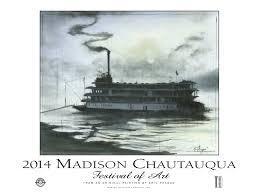 - Couples. Couples on benches. Couples out for a stroll. On a weekend like this, I like to imagine where they’ve come from. Are they staying the night or on their way out? Who are these folks smart enough to stick around past dark? There are young couples, their faces just inches apart, their shoulders touching. I imagine them leaning over to kiss after I walk past. There are older couples, two sets on one of the benches, segregated boys and girls. They’re talking about where they’ll go next. Daytona, maybe, they think.
- Couples. Couples on benches. Couples out for a stroll. On a weekend like this, I like to imagine where they’ve come from. Are they staying the night or on their way out? Who are these folks smart enough to stick around past dark? There are young couples, their faces just inches apart, their shoulders touching. I imagine them leaning over to kiss after I walk past. There are older couples, two sets on one of the benches, segregated boys and girls. They’re talking about where they’ll go next. Daytona, maybe, they think.
– Silhouettes against the river. Everyone is beautiful in this light. A fisherman with his pole. A loner sitting in a chair on one of the docks. Someone with a light attached to his head wading through the shallows, looking down into the water.
– The sound of a siren, crossing the bridge and heading up the hill on the Kentucky side. It echoes. Everyone raises their head to watch. Then it’s gone.
– The sound of geese, coming in low over my head in a battalion and landing on the river.
– The happy clustering of boats at the dock, pieced together like a jigsaw. The sound of voices floating up. The honk of a horn and an answer. The sound of music–“You Ain’t Woman Enough to Steal My Man.”
– Kids playing on the basketball court. Figures at the table under the picnic shelter. A lone girl walking down the middle of the street, her head swiveling from one side to the other.
– The lights still on in the empty food booths. The carnival ones making a kind of lonesome clicking noise as they flash. The strong smell of cinnamon from the roasted almond cart.
– The sound of the dock squeaking as the wake from a boat one the river reaches it.
– The pattern of light on the river as the waves reach the shore.
September 25, 2014
Sociological fatigue
I’ve been teaching sociology for over ten years now, mostly in the same place, and I think it’s okay to admit at this point that I am tired. Which is not to say that I’m quite ready to go find something else to do, but tired enough to ask, what is it exactly that I’m tired of?
When you teach at a small liberal arts college like I do, you’re supposed to be more intimate with disciplines outside your own. And I probably am. My closest friends are historians and philosophers and theologians. I serve on committees with those who teach biology and communication and business. But at least for me, it took a long time to realize that even at a small institution like mine, few of us are really doing the same thing in the classroom.
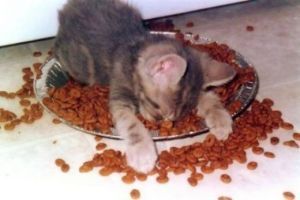 We are, of course, teaching different sized classes. I’m lucky enough to have inherited a strong sociology program; we teach a lot of students. But what makes my job so different from other disciplines is also the content of what I teach. Day after day in my classroom, I am tromping around, neck-deep, in the complicated muck of my students’ lives. I spend a lot of time metaphorically scraping it off at the end of the day. Maybe there’s a different way to teach sociology, but so far I haven’t found it.
We are, of course, teaching different sized classes. I’m lucky enough to have inherited a strong sociology program; we teach a lot of students. But what makes my job so different from other disciplines is also the content of what I teach. Day after day in my classroom, I am tromping around, neck-deep, in the complicated muck of my students’ lives. I spend a lot of time metaphorically scraping it off at the end of the day. Maybe there’s a different way to teach sociology, but so far I haven’t found it.
The point of sociology, at least the way I teach it, is to systematically dismantle my students’ taken-for-granted assumptions about the world they live in. My job is to unpack all the shit they bring with them from their lives up to that point and to ask them to think again. I often tell them sociology is about asking the questions that seem really stupid, but are more complicated than you think. Who I am? How did I get here? Why are things the way they are? Why do people act the way they do? In sociology, the answers are hardly ever what they at first appear to be.
A tiny example: why is your best friend your best friend? Because you have so many things in common? Because you just hit it off? Because you chose her or him? Maybe. But also because we live in a country that’s highly segregated by race and social class. The pool of people available to become your best friend were already limited by these structural forces. You probably didn’t come into contact much with people of different races or social classes, so there was no chance for you to hit it off. We could add other variables as well. Age and geography. You’re unlikely to become best friends with an older married woman while you’re single and in college. It’s harder (though less so nowadays) to become friends with someone on the other side of the country.
So, sorry, I help them to see, but when you “chose” your best friend, it wasn’t really quite the choice it seemed to be. Life is more complex than we’ve been led to believe. This is not a particularly comforting lesson to learn.
That’s my job. To guide them through a process that in many ways tears apart some of the fundamental building blocks of their lives. Let me show you the gaping hole in what you’ve always thought was true, we say. I think it’s an important job. It’s not always fun.
Add to that the fact that, at least in my department, there is no sociology class where we don’t talk about race, ethnicity, social class, gender and sexuality. Not a day or two on these topics. Not an hour on a Monday and then you get to move on. This is our bread and butter. This is what we do. We face down, straight on and with no safety gear, the misconceptions and baggage students bring to these topics. We explain to them over and over again that families on welfare do not have more children on average than families who are not on welfare; there is no such thing as a welfare queen. We look up the statistics to demonstrate that most college scholarship money still goes to white students at a higher rate than minorities. We try to show them that social class mobility in America is the exception and not the rule. We do that semester after semester after semester.
It is such an important thing to do. It can be so rewarding. It is so, so fucking exhausting. There are days when by comparison, teaching calculus sounds like heaven.
Of course, sociology is not the only field that lends itself to this kind of intimacy. Sociology classes are not the only ones that chip away at some of the things they hold most dear. But sometimes it feels to me like it’s harder in our discipline to step away from this part of the job. Perhaps in research methods. I find myself often longing for abstraction. Let’s find something to talk about that has nothing to do with our actual lives.
And of course, this is what I chose and this is exactly why I chose it. I wanted to teach something that mattered. Something I cared about. I want my students to have a better understanding of the world. I think this is an invaluable gift to give them. I care enough to want to do this well. It matters to me, and probably that’s the source of my exhaustion. If I could just dial it in, things would be a lot more relaxing.
Maybe the fatigue is temporary, a by-product of this particular semester. Of teaching a race class and a gender class at the same time. The weight of a new prep on top of that. My every day schedule. I don’t know. I think it’s okay to be tired every now and then. I hope it’s okay to admit it.

